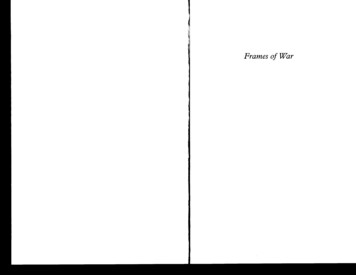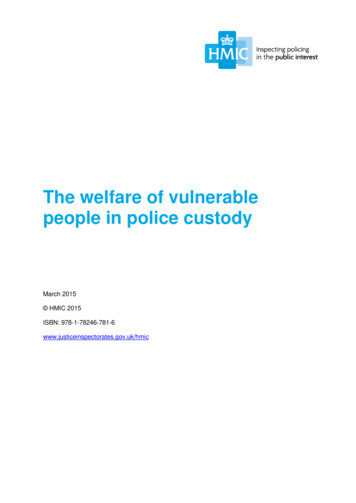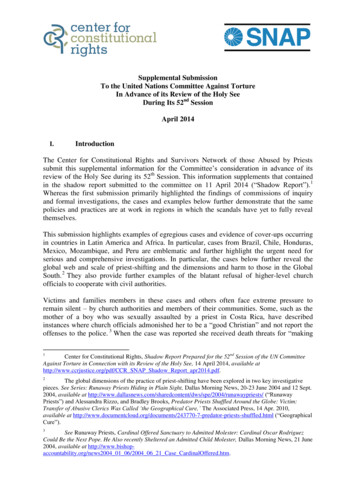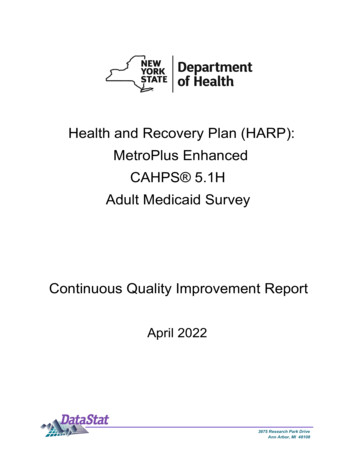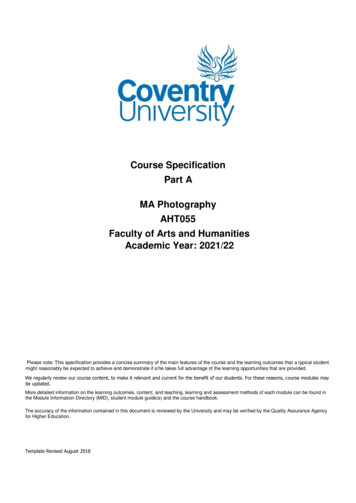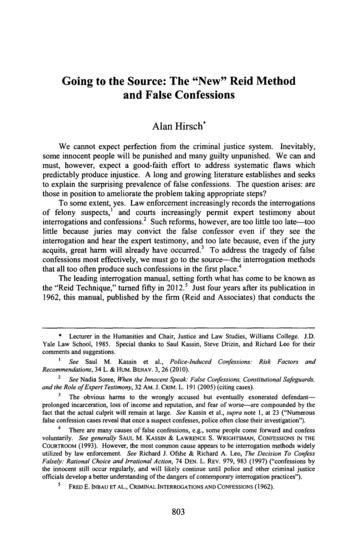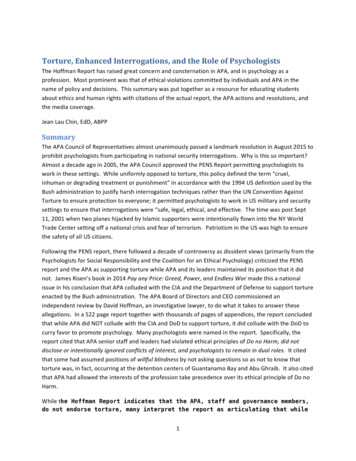
Transcription
Torture, Enhanced Interrogations, and the Role of PsychologistsThe Hoffman Report has raised great concern and consternation in APA, and in psychology as aprofession. Most prominent was that of ethical violations committed by individuals and APA in thename of policy and decisions. This summary was put together as a resource for educating studentsabout ethics and human rights with citations of the actual report, the APA actions and resolutions, andthe media coverage.Jean Lau Chin, EdD, ABPPSummaryThe APA Council of Representatives almost unanimously passed a landmark resolution in August 2015 toprohibit psychologists from participating in national security interrogations. Why is this so important?Almost a decade ago in 2005, the APA Council approved the PENS Report permitting psychologists towork in these settings. While uniformly opposed to torture, this policy defined the term “cruel,inhuman or degrading treatment or punishment” in accordance with the 1994 US definition used by theBush administration to justify harsh interrogation techniques rather than the UN Convention AgainstTorture to ensure protection to everyone; it permitted psychologists to work in US military and securitysettings to ensure that interrogations were “safe, legal, ethical, and effective. The time was post Sept11, 2001 when two planes hijacked by Islamic supporters were intentionally flown into the NY WorldTrade Center setting off a national crisis and fear of terrorism. Patriotism in the US was high to ensurethe safety of all US citizens.Following the PENS report, there followed a decade of controversy as dissident views (primarily from thePsychologists for Social Responsibility and the Coalition for an Ethical Psychology) criticized the PENSreport and the APA as supporting torture while APA and its leaders maintained its position that it didnot. James Risen’s book in 2014 Pay any Price: Greed, Power, and Endless War made this a nationalissue in his conclusion that APA colluded with the CIA and the Department of Defense to support tortureenacted by the Bush administration. The APA Board of Directors and CEO commissioned anindependent review by David Hoffman, an investigative lawyer, to do what it takes to answer theseallegations. In a 522 page report together with thousands of pages of appendices, the report concludedthat while APA did NOT collude with the CIA and DoD to support torture, it did collude with the DoD tocurry favor to promote psychology. Many psychologists were named in the report. Specifically, thereport cited that APA senior staff and leaders had violated ethical principles of Do no Harm, did notdisclose or intentionally ignored conflicts of interest, and psychologists to remain in dual roles. It citedthat some had assumed positions of willful blindness by not asking questions so as not to know thattorture was, in fact, occurring at the detention centers of Guantanamo Bay and Abu Ghraib. It also citedthat APA had allowed the interests of the profession take precedence over its ethical principle of Do noHarm.While the Hoffman Report indicates that the APA, staff and governance members,do not endorse torture, many interpret the report as articulating that while1
there was not explicit support for torture, there was complicit support viacollusion that enabled the Department of Defense to continue enhancedinterrogations which amounted to torture.The release of this Independent Review led to intense scrutiny, renewed criticism, self-reflection, angerand dismay among psychologists on both sides of the controversy. Some viewed APA’s role asunwittingly complicit. Others viewed this as continued denial and failure to be accountable. Somesought retribution and apology; others were in disbelief and anger that information had been withheldand of the lack of transparency about the complexity of language in the PENS report which led tounwitting complicity in a policy that facilitated and enabled the DoD to engage in enhancedinterrogation techniques. There was little agreement among the dissidents who had been vigilant for adecade in calling attention to these egregious behaviors vs. those who believed that APA was notsupporting torture in its policy and actions. There was a divergence of opinion about what to do andwhat was done. While personnel decisions were made, some felt this was not enough and that APAneed to clean house of its leadership, both of the board and staff. The image of the profession and APAas a helping profession with high standards of quality had been tarnished. While all agreed with theneed for healing and change, some called for retribution immediately and first while others cautionedagainst a rush to judgment and called for a focus on transformation and change. There was clearagreement across all groups that NOONE supported torture. This led to the almost unanimous vote toapprove the resolution reflecting the agreement that APA needed to reset its moral compass.Release of the Hoffman Report led to a firestorm of media coverage. Some sensationalized andoverreached the conclusions of the Hoffman Report; others aligned the conclusions with confirmingAPA’s complicity in torture and the Bush administration policy. A few provided a balanced coverage.At issue are several important for APA and psychologists going forward. First and foremost, APA hadviolated its own Ethical Code, and needs to reset its moral compass to ensure that ethics are central toits policies and actions. Second, the need for transparency, accountability, and a set of checks andbalance is paramount to ensure that APA Council does exercise its fiduciary role and responsibility to itsmembers on moral and ethical grounds in its commitment to human rights, and protection of the public.Thirdly, there had been a failure of leadership. APA favored advancing the profession of psychology(i.e., what is good for psychology) over its ethical principles of Do No Harm and maintained a “willfulblindness”. We need to ensure that our governance structure attends to this. Fourthly, we are nowliving in a global society and APA policy should be consistent with international law on human rightsviolations. Lastly, psychologists are human beings and subject to issues of social influence. To preventfuture occurrence, how do we attend to the: Implicit biases held by all including the fact that the targets of these enhanced interrogationmethods were all MuslimCounterintelligence and manipulation methods made prominent by APA’s relationship with theDepartment of DefenseAttitudes and feelings which may drive us to bad decisions and justifying actions inconsistentwith our ethical and moral principles, e.g., fear of terrorism, anger and need for retribution,Lucifer effect of how good people can do bad things, reliving of past trauma, scapegoating.2
Avoidance and silencing of dissident viewsIssues: Torture and National Security Interrogations National Security Interrogations at US Detention Centers raised concerns about human rightsviolations and torture in the early 2000so Guantanamo Bay Detention Centero Abu Ghirab Detention Centero Bush policy on interrogationso Terrorism: 9/11 openly perpetrated by Islam (fear and anger)o US Patriotism (safety and protection)Should psychologists be present in military enhanced interrogations of detainees?o APA PENS report 2005: psychologists can be present to ensure that interrogations wouldbe safe, legal, ethical and effectiveo Coalition for Humane Psychologists criticizedo Report rescinded 2013o APA Resolution 2015APA Ethical Codeo Do no Harmo Avoid Conflict of Interestso Avoid Dual RolesWhat is Torture?o Enhanced Interrogationso APA PENS: Safe, Legal, Ethical, Effective interrogationso UN definitiono Geneva Convention on Human Rightso US definition was narrowThe Hoffman Reporto Investigative Independent Review with conclusionso Did APA collude with the Department of Defense and the CIA to support torture?o APA takes strong action in response to independent review – APA Monitor, Sept 2015o Media Coverageo Conclusions of the Hoffman Report:§ collusion to support torture - No§ collusion to curry favor with the Dept of Defense – Yes§ violation of ethical code - YesIssues for Psychology and Social Psychology: Social Psychology and ActionHoffman Report raises questions for every area of social psychologyoEthical Dilemma: Do no harm; different social cognition and perception of samesituation; enhanced interrogations for the protection and good of all citizens vs.protection of single individual3
oooooooooGroup Conformity and Processes – Social influenceEthical Dilemma: Dual Roles – can psychologist serve to ensure interrogations are safeand ethical (safety monitors) while also participating to ensure that they are effective?Avoiding and silencing of Dissident ViewsLucifer Effect: Can good people do bad things?Fundamental Attribution Error – it is the person not the situationAttitudes and Attitude Change - Coping: terrorism and fear; anger and retribution;remembrance of Nazi war crimes and influence on present; scapegoating;Human and Civil Rights violations consistent with international lawCounterintelligence manipulation by CIA methodsPrejudice – targets of interrogations were Muslim4
Results of APA Council of Representatives Aug 2015 on policies to addresspsychologists’ role in national security interrogations.August 14, 2015We are resending the message to clarify that psychologists may notparticipate in any national security interrogations and to expand on theresolution’s other provisions.Dear Colleagues,We are writing to report on the results of the American Psychological Association’s(APA) Council of Representatives’ (Council) deliberations on policies to address themajor findings of the Independent Review that was conducted by David Hoffman andhis colleagues. The Hoffman Report was commissioned by APA’s Board of Directorsand found there was undisclosed coordination between some APA officials andDepartment of Defense psychologists that resulted in less restrictive ethical guidancefor military psychologists in national security settings. The findings were extremelytroubling and required action.During our annual convention in Toronto last week, the Council voted overwhelmingly toprohibit psychologists from participating in national security interrogations. The measurepassed by a vote of 157-1, with 6 abstentions and 1 recusal. The resolution: states that psychologists “shall not conduct, supervise, be in the presence of, orotherwise assist any national security interrogations for any military or intelligenceentities, including private contractors working on their behalf, nor advise on conditions ofconfinement insofar as these might facilitate such an interrogation”; redefines the term “cruel, inhuman or degrading treatment or punishment” (CIDTP) inthe 2006 and 2013 Council resolutions in accordance with the UN Convention AgainstTorture (rather than with the 1994 U.S. Reservations to this treaty, which were co-optedby the Bush administration to justify harsh interrogation techniques) to ensure itprovides protections to everyone, everywhere, including foreign detainees held outsideof the United States; continues to offer APA as a supportive resource for the ethical practice of psychologistsin organizational settings (including those in military and national security roles), while5
recognizing that they strive to achieve and are responsible to uphold the highest levelsof competence and ethics in their professional work; urges the U.S. government to withdraw its understandings of and reservations to the UNConvention Against Torture in keeping with the recent recommendation of the UNCommittee Against Torture; clarifies that the UN Committee Against Torture and the UN Special Rapporteur AgainstTorture would serve as the authorities for determining whether certain detention settingswould fall under the purview of the 2008 petition resolution as operating in violation ofinternational law; and ensures that federal officials will be informed of the expanded APA human rights policy,while stipulating prohibited detention settings and requesting that psychologists at thesesites be offered deployment elsewhere.The prohibition does not apply to domestic law enforcement interrogations or domesticdetention settings where detainees are under the protection of the U.S. Constitution.The policy adopted by the Council clarifies that psychologists can only provide mentalhealth services to military personnel or work for an independent third party to protecthuman rights at national security detention facilities deemed by the United Nations to bein violation of international law, such as the U.N. Convention Against Torture and theGeneva Conventions.While this new Council resolution invokes Ethical Principle A to “take care to do noharm,” it does not amend the Ethics Code and is not enforceable as a result. However,Council’s implementation plan for the new policy requests that the Ethics Committeeconsider a course of action to render the prohibition against national securityinterrogations enforceable under the Ethics Code.The Council also voted to create a blue-ribbon panel of psychologists and nonpsychologist experts to review APA’s Ethics Office and ethics policies and proceduresand issue recommendations to ensure our policies are clear and aligned with the verybest practices in the field. In addition, we will institute clearer conflict-of-interest policiesgoing forward.These positive and momentous actions by APA’s Council and Board of Directors aresignificant and concrete steps toward rectifying past organizational shortcomings. Whilewe are pleased with and humbled by the steps we have taken, we must be deeplyreflective about the ways in which we must continue to put front and center protectinghuman rights and ethically serving the public through our science, practice, educationand advocacy efforts.We are moving forward in a spirit of reform and reconciliation. We have much workahead to change the culture of APA to be more transparent and clearly focused onhuman rights and our core values as psychologists. The steps we are taking are aimedat resetting our moral compass and ensuring that APA regains the trust of its members6
and the public.We hope you will be part of this change. We appreciated the opportunity to hear fromthe convention participants who were able to attend the town hall meeting about thesematters. For those who could not attend or who were not able to speak, know that wegreatly value your honest feedback and suggestions on next steps for APA as we moveforward. Please send your ideas and recommendations to IRfeedback@apa.org or visitthe Independent Review page on www.apa.org, where there is a section to providefeedback.Together, we can foster change and build a stronger association.Sincerely,Susan McDaniel, PhDNadine Kaslow, PhD, ABPPAPA President-ElectAPA Past PresidentMembers of the Special Committee for the Independent Review7
Source Reports (see folder) Hoffman Report conclusionso Collusion:§ critics maintained that American Psychological Association colluded with theCIA, the Pentagon, and the White House in support of the Bush Administration’storturous “enhanced interrogation program; report concludes they did NOT.Rather, it was: to curry favor with the Dept of Defense because its view wasthis would promote psychology.o Conflict of interest existed for some individuals named and for APA as an organizationnamed; it was not disclosed and Intentionally ignoredo Failure of leadership: Dilemma over conforming to ethical principles vs. advancing theprofession of psychology or what is ethical vs. what is good for psychology. Some APAleaders, staff and governance members maintained a “willful blindness” , i.e. theyturned the other way, did not ask questions, and failed to act.o Definition of Do no harm: Environment of 9/12 led to a focus on us (U.S.) as potentialvictims needing protection vs. detainees as human beings and their right to humaneinterrogation§ Changed the definition of Do no harm or ignored it in the name of nationalsecurityo Willful insertion of “unlawful”, and allowing psychologists to engage in interrogations tomake it “safe, legal, ethical, and effective” gave carte blanche to continue enhancedinterrogationo Ethical Failures§ Failure to follow up on ethics complaints or acting in dual role§ Acted to protect psychologists rather than the public§ Acted on interest of psychology rather than ethical principle§ Casebook never publishedPENS Task Force Reporto In July 2013, APA’s governing Council of Representatives adopted the “Policy Related toPsychologists’ Work in National Security Settings and Reaffirmation of the APA PositionAgainst Torture and Other Cruel, Inhuman, or Degrading Treatment or Punishment.”This policy unifies into a single document prior APA policies dating to 1986 related todetainee welfare and interrogation. As part of the policy reconciliation process, thecouncil also voted to rescind the 2005 Report of the APA Presidential Task Force onPsychological Ethics and National Security (PENS) and two other APA policies dated 2007and 2008. These policies had become outdated or rendered inaccurate with the passageof subsequent policies, most notably a 2010 revision of the APA Ethics Code and the2013 policyo 7. Psychologists may serve in various national security-related roles, such as aconsultant to an interrogation, in a manner that is consistent with the Ethics Code, andwhen doing so psychologists are mindful of factors unique to these roles and contextsthat require special ethical considerationo safe, legal, ethical, and effective8
The role of human rights standards in an ethics code. While all Task Force members feltthat respect for human rights is critical, some task force members felt strongly thatinternational standards of human rights should be built into the ethics code and othersfelt that the laws of the United States should be the touchstone.APA Council of Representatives Meeting and Resolution – Aug 2015APA Ethics CodeAPA Human Rights Activities – list from Gwen KeitaReisner and Soldz vs. APA board recommendationso Recommended Board Actions Related to the Report of the Independent Review RelatingTo APA Ethics Guidelines, National Security Interrogations And Tortureo Tension between recommendations proposing different solutions:§ call for punishment and retribution vs. transformation and change§ call for punitive and repentance actions toward individuals named in report tomake them accountable, i.e. apology, remove from office or governance,stripping of awards§ call for action to prevent this in future; looking forward to change policy andpractice towards ethics as central, checks and balances, transparency,accountability§ need for healing§ anger at how APA ignored dissident views for 10 years vs. dismay and anger athow many were unwittingly complicito Worries:§ minimizing the extent of those involved§ taking responsibility for what has occurred in the name of American psychology§ moving too quickly from the hard work of looking more deeply into what thesehorrors really reflect about us as a profession or as a culture§ Need for Due Process for those named in report vs. forgetting the plight of thedetainees who have been tortured§ Direct vs. indirect culpability and complicity: do we indict, condemn those whowere indirectly involved and how far do we go? analogous to racism, sexism,violenceDissidents over the last 10 yearso Psychologists for Social Responsibility www.psysr.orgo Coalition for an Ethical Psychology www.ethicalpsychology.orgo Media CoveragePre APA Resolution following release of Hoffman Report Psychologists Shielded U.S. Torture Program, Report Finds -shielded-us-torture-program-reportfinds.html?emc edit na 20150710&nlid 53601746&ref cta& r 0 U.S. Justice Department Must Investigate American Psychological Association’s Role in U.S.Torture Program New Report Confirms Health Professionals Violated Core Ethics 9
rogram.html?referrer http://www.physiciansforhumanrights.org/?referrer ological-associations-roleHoffman Report Coverage Summary: July 20, 2015Since the New York Times broke the story on the Hoffman report on the afternoon of Friday,July 10, 2015, we have identified approximately 250 articles relating to the issue. While therewas an initial flurry of activity from various major media outlets including the Washington Post,USA Today, The Guardian and The Chronicle of Higher Education we were surprised that manymajor media (Associated Press and Reuters among them) failed to cover the story at all. Whenit appeared in the Washington Post, it was relegated to page 5 of the Saturday edition.The bulk of the coverage (over 200 articles) concerned the initial release of the Hoffman report.While there were a few stories on the personnel actions announced the following week, therewas essentially little interest in the mainstream media.It is important to note that when preparing for the media onslaught we had expected thousandsof news articles. To have less than 250 at this point is a good thing. It means the mainstreammedia, and hence the general public don’t consider this to be important (by their standards). Itis of vital importance by APA standards and we can now go about doing what needs to be doneto right the ship for our members without the distraction of a media circus.Below is a sampling of some of the more high-profile media outlets and their coverage.oooooOutside Psychologists Shielded U.S. Torture Program, Report Finds - The New .New York Times - July 10, 2015The 542-page report, which examines the involvement of the nation's psychologists andtheir largest professional organization, the American Psychological Association, with theharsh interrogation programs of the Bush era, raises repeated questions .Psychologists Who Greenlighted Torture - The New York TimesNew York Times - July 10, 2015It found that top members of the American Psychological Association, the largestprofessional organization of psychologists, colluded with officials at the Pentagon andthe C.I.A. to keep the group's ethics policies in line with tactics that .Inquiry: Psychologists group colluded with Pentagon, CIA on interrogations .Washington Post - July 10, 2015Leaders of the American Psychological Association secretly collaborated with officials atthe Pentagon and CIA to weaken the association's ethical guidelines and allowpsychologists to take part in coercive interrogation programs after the Sept. 11 .Report: Top psychologists bolstered CIA, Pentagon torture - USA TodayUSA TODAY - July 10, 2015WASHINGTON — The American Psychological Association's board Friday urged a ban onpsychologists participating in prisoner interrogations in the wake of a scathing reportthat some of its members persuaded the Defense Department to engage in harsh .Psychologists authorize CIA, DOD torture, says report. Does torture work? ( .Christian Science Monitor - July 11, 201510
oooooooooA new report detailing how the APA helped authorize 'enhanced interrogations' hasprompted renewed questions about torture's effectiveness in intelligence-gathering.Psychologists Group Apologizes For Backing Post-Sept. 11 Interrogation Tactics .NPR - July 10, 2015The American Psychological Association has apologized for actions that may haveenabled brutal interrogation techniques used by the U.S. government after the attacksof Sept. 11, 2001. NPR's Jon Hamilton, who is reporting on the story for our Newscast .US psychologists linked to CIA torture - FT.comFinancial Times - July 10, 2015The leading industry association for US psychologists colluded with the CentralIntelligence Agency and the Pentagon to allow its members to take part in controversialinterrogations at Guantánamo Bay and at other sites around the world, according to a .US torture doctors could face charges after report alleges post-9/11 - The .The Guardian - July 11, 2015For more than a decade, the American Psychological Association (APA) has maintainedthat a strict code of ethics prohibits its more than 130,000 members to aid in the tortureof detainees while simultaneously permitting involvement in military and .Psychologists 'protected CIA torture programme' - TelegraphTelegraph.co.uk - July 11, 2015The American Psychological Association (APA) colluded with Bush administrationofficials, weakening ethical guidelines, to allow psychologists to take part in enhancedinterrogation techniques – including torture – after 9/11, according to a blistering .American Psychological Association helped cover up CIA torture Daily Mail .Daily Mail - July 11, 2015Some of America's leading psychologists took part in and covered up the CIA's forcefulinterrogation techniques - including torture - in the wake of 9/11, according to ascathing internal review. The ethics director at the American Psychological .What a Bombshell Report Tells Us About the APA's Abetting of Torture .Chronicle of Higher Education - July 13, 2015The American Psychological Association gave psychologists involved in the often-brutalinterrogation of detainees at Guantánamo Bay and elsewhere a free pass. Theassociation tweaked its ethics code for the convenience of the U.S. military. For years .3 Leave Jobs Over Psychologists' Involvement in Terrorism Interrogations - The .New York Times - July 14, 2015The board of the organization, the American Psychological Association, said that threetop officials, including the chief executive, Norman Anderson, were leaving the group.Another senior official was forced out last week, just before the report on .Three senior officials lose their jobs at APA after US torture scandal - The .The Guardian - July 14, 2015As the American Psychological Association copes with the damage reaped by anindependent investigation that found it complicit in US torture, the group announced onTuesday that its chief executive officer, its deputy CEO and its communications chief .Justice Matters: Holding People Who Torture to Account Widney BrownHuffington Post - July 14, 2015As a new report on the role of the American Psychological Association (APA) in justifyingand defending the U.S. government's torture program provides yet more evidence ofthe crimes committed in the name of national security, justice remains elusive.11
The One Email That Explains Why Three APA Officials Had to Go - Research .Chronicle of Higher Education - July 15, 2015The American Psychological Association announced on Tuesday that three top officials— including its chief executive officer — would leave the troubled organization. This wasno surprise: After an independent investigation found that the APA had .o APA overhauling policies and leadership after torture report Science/AAAS .Science /AAAS - July 14, 2015After years of denying that it had given scientific and ethical legitimacy to torture by theU.S. government, the American Psychological Association (APA) last week accepted thefinding of an external investigation that concluded it had done just that .o Torture, American-Style: The Role of Money in Interrogations Vanity FairVanity Fair - July 14, 2015The American Psychological Association, roughly the equivalent of the AmericanMedical Association for psychologists, played a crucial, long-hidden role in the story ofAmerican torture. James Elmer Mitchell, who created the C.I.A.'s torture program .o Lessons must be learned after psychology torture inquiry : Nature News .Nature.com - July 14, 2015In 1917, when the field of psychology was young and struggling to gain acceptance inscience, the American Psychological Association (APA) needed a friend. Like many at thetime, it decided to assist the war effort by working with the US military.o Don't Cut Research Ties With the Military - Commentary - The .Chronicle of Higher Education – July 17, 2015The new, 542-page independent review commissioned by the ethics committee of theAmerican Psychological Association has generated considerable attention .o Psychology association worked with defense officials on loose interrogation .Boston Globe - July 20, 2015WASHINGTON — Since its founding in Worcester 123 years ago, the AmericanPsychological Association has been the preeminent voice promoting, as it says in itsmission statement, the power of psychology to “benefit society and improve people'slives.”Why Ethics Codes fail: Historical view of APA ethics ly-failPsychology Is In Crisis Over Role In BushEra Torture: -grapple-with-tortureVasquez on The Hoffman Report: Resetting APA’s Moral Compass” focuses on lessons learned,and is online at: http://melbavasquezphd.com/HoffmanReport.pdfVideo interview with James Risen, NY Times Reporter before APA votehttp://www.democracynow.org/2015/8/7/james risen in sharp break fromLevant apologyo Guardian story about Jean Maria Arrigo, the psychologist who stood up against the torturecollusion and was derided and smeared by APA officials, including Gerald Koocher. Dr. Koocherwas president-elect of APA when he took part in the PENS Task rigo “But the acrimony intensified after Arrigo took her concerns public at APAconventions. One of those meetings, in 2007 in San Francisco, attracted the attention of12
journalist Amy Goodman, who used it for a story on her Democracy Now broadcast. In response,Koocher told Goodman in an
prohibit psychologists from participating in national security interrogations. The measure passed by a vote of 157-1, with 6 abstentions and 1 recusal. The resolution: states that psychologists "shall not conduct, supervise, be in the presence of, or otherwise assist any national security interrogations for any military or intelligence



